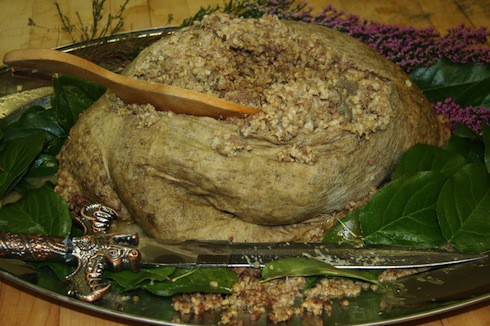Scotland has a patron saint but it is the birth of the poet Robert Burns that stands out on the calendar and permeates onto TV, offices and schools, with many organisations holding a Burns Night.
The centrepiece of the evening is the haggis, the Great chieftain o’ the puddin’-race, and so associated with the Scottish nationality that its ‘favourite son’ wrote a poem extolling its virtues.
But the words of the address, delivered in Scots, can be as foreign to the ear as the dish can be to the palate. So here is a quick users’ guide to help you understand this wonderful poem; one that is as deep and strange and rich as the haggis itself.
First, to the puddin’. Haggis holds an odd place in the world of cuisine; a meal as likely to evoke delicious, Proustian reverie as it is revulsion. And, like black-pudding and sausage, the less you know about its ingredients the more you’re likely to enjoy it. Haggis is usually served with neeps (turnip) and tatties (potatoes).
After the taking of seats, a few formalities and the filling of glasses, the haggis is brought in to great fanfare. At this point the room will be upstanding. The haggis, atop its large silver tray, is then paraded through the hall, a delectable debutant at a ball. A piper will lead the way, playing a medley of Burns’ songs – perhaps A Man’s a Man for a’ That – on his bagpipes until the haggis is laid to rest upon the host’s table.
Then to the main event. The host will now stand, in his hand a Sgian-Dubh (a small dagger) and address the mighty offering with Burns’ poem. Penned in 1786, it has been recited at suppers up and down the land since. And here it is (with helpful translation):
Address tae a Haggis (in Scots and English)
| Fair fa’ your honest, sonsie face, Great chieftain o’ the puddin-race! Aboon them a’ ye tak your place, Painch, tripe, or thairm: Weel are ye wordy o’ a grace As lang’s my arm. |
|
| Salutations, friendly-looking King of sausages! You are much better than other sausages and are therefore deserving of a blessing as long as my arm. |
|
| The groaning trencher there ye fill, Your hurdies like a distant hill, Your pin wad help to mend a mill In time o’ need, While thro’ your pores the dews distil Like amber bead. |
|
| You fill the plate so well and have hilly buttocks. Your pin may one day prevent an industrial accident and you smell like whisky. |
|
| His knife see rustic Labour dicht, An’ cut you up wi’ ready slicht, Trenching your gushing entrails bricht, Like ony ditch; And then, O what a glorious sicht, Warm-reekin, rich! |
|
| This chap is going to sharpen his knife and do a jolly good job of cutting you up So that your insides fall out. They look quite tasty. |
|
| Then, horn for horn, they stretch an’ strive: Deil tak the hindmaist! on they drive, Till a’ their weel-swall’d kytes belyve, Are bent like drums; Then auld Guidman, maist like to rive, “Bethankit” hums. |
|
| Now everyone’s digging in. They won’t stop until it’s time to reach for the Gaviscon. Then the fellow with the worst indigestion will say Grace. |
|
| Is there that o’re his French ragout Or olio that wad staw a sow, Or fricassee wad mak her spew Wi’ perfect scunner, Looks down wi’ sneering, scornfu’ view On sic a dinner? |
|
| No gourmet-types who have sampled foreign foods should look disdainfully at the haggis. | |
| Poor devil! see him ower his trash, As feckless as a wither’d rash, His spindle shank, a guid whip-lash, His nieve a nit; Thro’ bloody flood or field to dash, O how unfit! |
|
| Look at that poor blighter – he doesn’t have a haggis; he’s frightfully skinny and certainly wouldn’t stand up to any rough-housing. |
|
| But mark the Rustic, haggis fed, The trembling earth resounds his tread. Clap in his wallie nieve a blade, He’ll mak it whistle; An’ legs an’ arms, an’ heads will sned, Like taps o’ thristle. |
|
| But behold this fine young buck, he eats haggis, you see. And would probably be quite useful in a contretemps. |
|
| Ye Pow’rs wha mak mankind your care, And dish them out their bill o’ fare, Auld Scotland wants nae skinkin ware That jaups in luggies; But, if ye wish her gratefu’ prayer, Gie her a haggis! |
|
| Should any omnipotent deities be listening in: if you want grateful prayers from Scotland – you’d best provide some haggis. |
|
Bild: Jonathunder auf Wikimedia Commons (CC-BY-SA-3.0)
